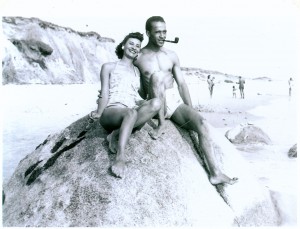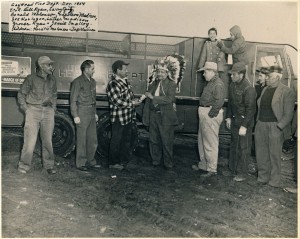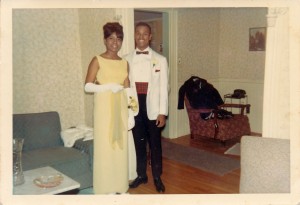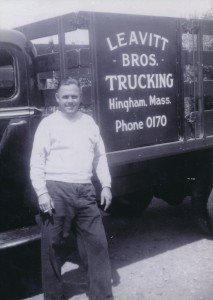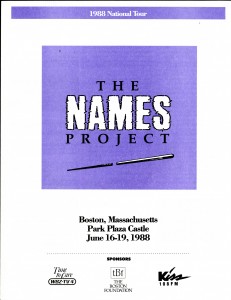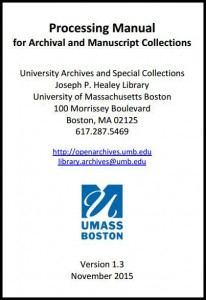
Processing Manual for Archival and Manuscript Collections, by Meghan Bailey, Jessica Holden, and Joanne Riley
During my time as the processing archivist in University Archives & Special Collections at UMass Boston, I’ve been working hard to ensure our processing* procedures reflect current professional standards and are efficient and consistent. To that end, I led the department in the development of a processing manual to assist students, interns, and volunteers, as well as other library and archives staff, with archival processing projects. Importantly, my colleagues Jessica Holden and Joanne Riley played pivotal roles in preparing, testing, and championing the development of this manual – not, I should add, a quick and easy undertaking!
(*Processing is the term archivists use to describe the work of making a new collection ready and available for access to researchers, students, and staff. Donated collections often come to the repository in disarray. Boxes and folders are unlabeled, disorganized, and dusty, and may contain duplicate materials and personally identifiable information. It is the archivist’s job to ensure ease of access, and to assimilate the historical relevance and material content of the collection and communicate this knowledge in the finding aid for researchers.)
As part of keeping tabs on activities in the archival professional community, I am a member of the NEAdiscuss listserv, a listserv created for the New England archives community to encourage communication and announcements pertaining to the profession.
Last week, I noticed an email come through the listserv inquiring about processing plans and workflows. Immediately after this email, several other members of the listserv responded, indicating their interest in this information.
At the University of Massachusetts Boston, we are fortunate to have ScholarWorks, an open access digital repository for scholarship and research by faculty, staff, and students at the university and managed by staff in the Joseph P. Healey Library. We had been planning to post the manual to ScholarWorks for some time and this exchange on the NEAdiscuss listserv moved us to action.
After posting our processing manual to ScholarWorks on February 11, I forwarded the link to my colleagues in listserv-land. To my surprise, the manual was downloaded 35 times in 24 hours and, as of today, the manual has been downloaded almost 50 times!
The importance of sharing ideas, workflows, and practices in the archival profession cannot be understated. It encourages collegiality and limits the duplication of effort, ultimately advancing the profession. This is especially important as archivists forge ahead with the digitization of archival collections. As nerdy as it may seem, our seemingly obsessive, hyper-vigilant focus on processes and workflows is essential to providing access to archival collections for communities of researchers, students, faculty, and staff.
I welcome any feedback or thoughts on our department processing manual. The manual will be updated periodically, as our work processes evolve to support current and new materials. Please check ScholarWorks for the most updated version.
University Archives & Special Collections in the Joseph P. Healey Library at UMass Boston collects materials related to the university’s history, as well as materials that reflect the institution’s urban mission and strong support of community service, notably in collections of records of urban planning, social welfare, social action, alternative movements, community organizations, and local history related to neighboring communities.
University Archives & Special Collections welcomes inquiries from individuals, organizations, and businesses interested in donating materials of an archival nature that that fit within our collecting policy. These include manuscripts, documents, organizational archives, collections of photographs, unique publications, and audio and video media. For more information about donating to University Archives & Special Collections, click here or email library.archives@umb.edu.

